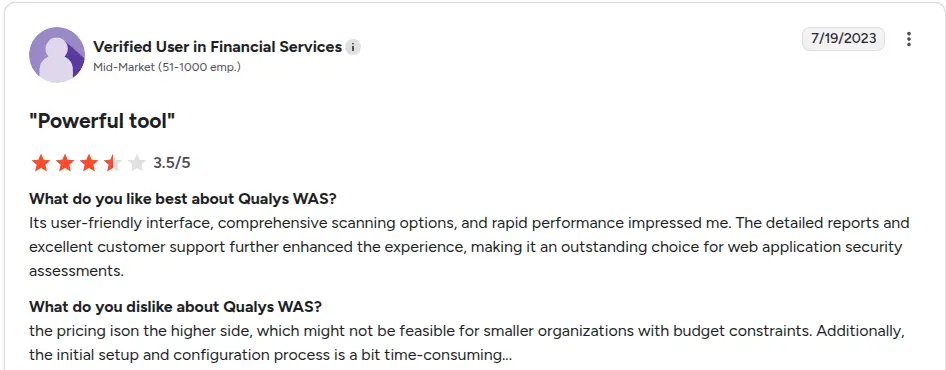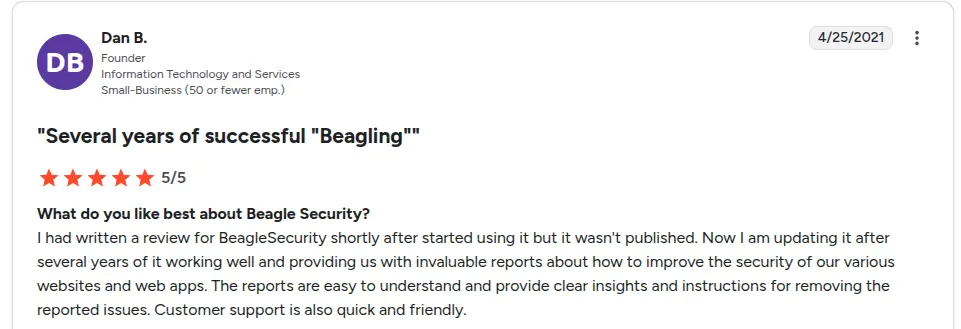![Qualys vs Rapid7: Which is the best choice for you? [2025] Qualys vs Rapid7: Which is the best choice for you? [2025]](/blog/images/qualys-vs-rapid7.webp)
Security breaches are evolving, attack surfaces are expanding, and organizations need tools that not only detect vulnerabilities but help remediate them fast.
Two of the most widely adopted platforms in this space are Qualys and Rapid7. Both offer robust capabilities in vulnerability management, asset visibility and security analytics but with different approaches.
If you are a part of a lean IT team looking for a vulnerability management tool then this comparison will help you decide which solution aligns better with your operational needs.
Overview of Qualys and Rapid7
Qualys is a unified cloud-based security platform offering vulnerability management, asset inventory, compliance monitoring, and web application scanning. Ideal for large-scale enterprise environments that need central visibility and control.
Rapid7 is a security operations-focused platform centered around InsightVM for vulnerability management and Metasploit for penetration testing. Designed for teams who want both visibility and exploit validation.
Qualys vs Rapid7 at a glance
| Features | Qualys | Rapid7 |
|---|---|---|
| Main features | Dynamic Application Security Testing (DAST) | Vulnerability management, exploit testing |
| AI features | Not adopted | Not adopted |
| Ease of use | Easy to use | Moderate |
| Free trial | Yes | Yes |
| Pricing range | Custom quote($1,995/25 web apps per year) | Custom quote (usually $20k+) |
| G2 rating | 4.3/5 | 4.3/5 |
| Gartner Peer Insights rating | 4.4/5 | 4.3/5 |
An alternative web & API penetration testing platform for comparison: Beagle Security
While Qualys and Rapid7 have long dominated the vulnerability management space, their architectures are rooted in traditional security models.
Users often suffer from compliance- heavy workflows and agent based scanning. For many fast-moving DevSecOps teams, these tools can feel complex and costly too.
Enter Beagle Security, the next-generation, AI-powered web and API penetration testing platform that redefines usability, flexibility and affordability.
Why Beagle Security might be a better fit
- No learning curve
Beagle Security is designed for immediate usability with no complex setup or training required. Security teams can launch tests within minutes, saving their valuable time.
- Contextual reports
Beagle Security provides human-readable, actionable insights tailored for both developers and decision-makers to quickly address issues.
- No target lock-in
Unlike Rapid7 and Qualys, Beagle Security allows unlimited flexibility. Test any number of web apps or APIs without being restricted to predefined targets.
- AI capabilities built-in
Uses AI to simulate real-world attack logic, handle business logic authentication, select test cases intelligently, and reduce false positives automatically.
- Most affordable pricing
Beagle Security delivers enterprise-grade security testing starting at under $119 per month which is ideal for both in-house security teams and MSSPs looking for cost-effective tools.
Qualys vs Rapid7 vs Beagle Security: Feature comparison
| Features | Rapid7 | Qualys | Beagle Security |
|---|---|---|---|
| AI login & session handling | No | No | Yes |
| Real penetration simulation | via Metasploit separately | No | Yes |
| Custom API testing | Limited | Moderate | Yes |
| False positive filtering | Manual review | No | Yes (AI-assisted) |
| Contextual reports | Risk-focused & technical | Technical | Yes |
Qualys Web Application Scanning features
Key features of Qualys WAS:
TruRisk™ prioritization engine
Integration with CI/CD tools
Web Application Firewall (WAF) virtual patching support
Asset inventory and discovery
Qualys Web Application Scanning (WAS) is a component of Qualys VMDR, a broader platform. Even in complicated digital contexts, it is intended to assist enterprises in automatically identifying their web assets, continuously monitoring them for vulnerabilities, and producing reports that satisfy compliance standards.
Qualys’ powerful TruRisk™ rating engine, which rates vulnerabilities based on their severity and exploitability, allows security teams to focus on what actually matters.
Users frequently complain about the platform’s steep learning curve, lengthier scan times, and greater false positive rates when compared to more developer-centric technologies, even though it scales effectively across large companies and regulatory settings.
Rapid7 InsightAppSec features
Key features of Rapid7 Insight AppSec:
InsightAppSec with DAST scanning
Scheduled scanning and scan blackouts
Risk scoring and vulnerability tracking
Visual dashboards and customizable reporting
CI/CD integrations
Compliance focused reports
Rapid7’s application security offering is built around InsightAppSec, which focuses on dynamic testing and integrates natively with InsightVM for a broader security view.
Unlike platforms with multiple overlapping tools, Rapid7 simplifies user access with a unified Insight platform.
What sets it apart is the integration with Metasploit, allowing teams to validate real-world exploitability, though this requires manual intervention and deeper security knowledge.
While developers may appreciate the CI/CD integrations, the platform still leans toward security team workflows. Its support for modern app architectures is decent, but it lacks true AI-powered automation.
Compliance support is available but not as granular or automated as competitors like Qualys or Beagle Security.
Beagle Security features
Key features of Beagle Security include:
AI-powered penetration testing engine
Support for private and GraphQL APIs
Contextual, compliance-ready reports
CI/CD integration for shift-left security
Automation with flexibility
Real-world penetration testing simulations
Easy onboarding and intuitive UX
Business logic testing and login flows
Beagle Security is made to work with the complicated, contemporary tech stacks and quick development cycles of today. With the help of AI-driven reasoning, it provides full-spectrum DAST capabilities that allow it to test login-protected areas, comprehend app behavior and rank vulnerabilities according to their business impact.
Beagle Security’s context-aware reports, which provide remedial advice relevant to particular technologies, are where it really stands out. The feedback loop between vulnerability findings and patches is shortened.
Additionally, it enables logic-heavy apps where standard scanners are inadequate for GraphQL and REST APIs. The platform performs sequences that resemble penetration tests, simulating the actions of an attacker to find minute vulnerabilities while eliminating noise through false positive suppression.
Rapid7 vs Qualys vs Beagle Security: Pricing comparison
| Platform | Starting price | Free trial |
|---|---|---|
| Rapid7 | $175/month for 1 app | 30 day free trial |
| Qualys | Custom quote | 30 day free trial |
| Beagle Security | Self-serve plans start at $1188/year Enterprise plans start at $8500/year for 5 concurrent tests | 14 day free trial |
Qualys pricing
Pricing is determined on the amount of modules and apps you wish to scan. It uses a per-target cost basis for the majority of use cases, which can quickly increase in dynamic contexts.
Qualys lacks a free trial and frequent bundling with other Qualys products making standalone web scanning less accessible.
Rapid7 pricing
Pricing for Insight AppSec is published by Rapid7 and starts at $175 per month for a single application. The annual cost increases dramatically for corporate firms with a high volume of applications.
For teams with several assets, this makes it one of the more costly options. It might be unnecessary for teams who are only concerned with application and API security, but it might make sense for businesses that are already utilizing other Rapid7 technologies.
Beagle Security pricing
Beagle Security’s pricing is refreshingly transparent. Pricing is based on features and usage, not arbitrary target limits. It offers annual and monthly plans with MSSP-friendly models. Most importantly, you can try it for free before actually choosing.
Even at lower tiers, you get access to core features including AI automation, business logic testing, and CI/CD integration, making it one of the most cost-effective platforms for proactive security testing.
Qualys vs Rapid7 vs Beagle Security: Customer reviews comparison
| Criteria | Rapid7 | Qualys | Beagle Security |
|---|---|---|---|
| Ease of use | 88% | 82% | 95% |
| Ease of setup | 88% | 81% | 96% |
| Ease of admin | 90% | 86% | 93% |
| Quality of support | 80% | 74% | 97% |
| G2 ratings | 4.3/5 | 4.3/5 | 4.7/5 |
As of latest G2 comparison in July 2025
Rapid7 reviews
Users value the platform’s visualization capabilities and integration with other Rapid7 solutions. However, a high learning curve, scan performance problems, and a lack of context-aware remediation help are cited by some as significant disadvantages.

Source: G2
Qualys review

Source: G2
Beagle Security reviews
Beagle Security consistently earns praise for its clean, intuitive UI, developer-friendly reports and realistic attack simulations. Users value how the platform balances depth and usability, with AI-driven testing that feels tailored rather than generic.
Onboarding is seamless, even for teams without deep security expertise and launching a test takes just a few clicks.
Reports are structured to deliver both technical clarity and business relevance, making it easier for engineering teams to act without waiting on security analysts. The responsive support team and transparent pricing only strengthen its appeal to modern, fast-moving product and DevSecOps teams.

Source: G2
Qualys vs Rapid7 vs Beagle Security: Which is best for you?
Choose Qualys if:
You need an all-in-one, cloud-native security platform.
Your dev team adjusts with outdated, clunky UI and frustrating false positives.
You can manage inconsistent support and difficult third-party integrations.
You want a modern, intuitive platform with strong user experience and visual reporting.
Choose Rapid7 if:
You value strong integration with SIEM, cloud, and EDR tools like InsightIDR and InsightCloudSec.
You need proactive threat detection, prioritization, and automation built into your vulnerability management process.
You’re looking for responsive customer support and a solution that’s easy to deploy and scale across hybrid environments.
Choose Beagle Security if:
You value AI-driven testing, actionable remediation, and CI/CD-friendly integration.
You want real-world attack simulations without dealing with complicated setup or tuning.
You’re done with target lock-ins and overpriced FQDN-based plans.
You test modern web apps, APIs, GraphQL, and apps with dynamic login flows.
You need enterprise-grade testing without the complexity or premium pricing.
Try Beagle Security for free to see how it compares to Tenable and Qualys
Rapid7 against Qualys can frequently feel like having to choose between two strong, but complicated, legacy-heavy platforms that were created in a different age.
Beagle Security is the obvious choice if you’re searching for something more intelligent, quicker, and designed for contemporary web and API security.
Without the complexity or business bloat, it provides the features you require, such as developer-friendly reports, AI-powered testing, and smooth CI/CD integration. Discover why expanding teams and security-conscious companies are choosing Beagle Security.
To see Beagle Security in action, schedule a demo or start a 14-day free trial.



![Acunetix vs Nessus: Which is right for you? [2026] Acunetix vs Nessus: Which is right for you? [2026]](/blog/images/acunetix-vs-nessus-which-is-right-for-you-2026-cover.webp)
![OpenVAS vs Nessus: Which is the best choice for you? [2025] OpenVAS vs Nessus: Which is the best choice for you? [2025]](/blog/images/openvas-vs-nessus-which-is-the-best-choice-for-you-2025-cover.webp)


![Top enterprise application security tools [2026] Top enterprise application security tools [2026]](/blog/images/blog-banner-four-cover.webp)
![Top vendor application security testing tools [2026] Top vendor application security testing tools [2026]](/blog/images/blog-banner-six-cover.webp)
![Best API security tool for developers [2026] Best API security tool for developers [2026]](/blog/images/blog-banner-five-cover.webp)

![Top Bright Security alternatives [2026] Top Bright Security alternatives [2026]](/blog/images/blog-banner-one-cover.webp)